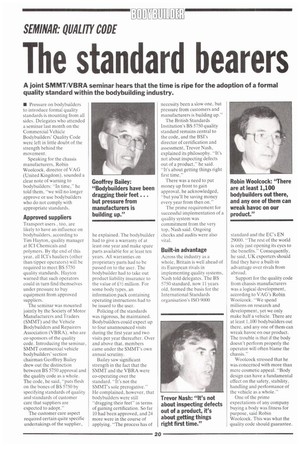The standard bearers
Page 108

If you've noticed an error in this article please click here to report it so we can fix it.
A joint SMMT/VBRA seminar hears that the time is ripe for the adoption of a formal quality standard within the bodybuilding industry.
• Pressure on bodybuilders to introduce formal quality standards is mounting from all sides. Delegates who attended a seminar last month on the Commercial Vehicle Bodybuilders' Quality Code were left in little doubt of the strength behind the movement.
Speaking for the chassis manufacturers, Robin Woolcock, director of VAG (United Kingdom). sounded a clear note of warning to bodybuilders: -In time," he told them, "we will no longer approve or use bodybuilders who do not comply with appropriate standards.
Approved suppliers
Transport users , too, are likely to have an influence on bodybuilders, according to Tim 'Layton, quality manager at ICI Chemicals and polymers. By the end of this year, all ICI's hauliers (other than tipper operators) will be required to meet BS 5750 quality standards. Hayton warned that such operators could in turn find themselves under pressure to buy equipment from approved suppliers.
The seminar was mounted jointly by the Society of Motor Manufacturers and Traders (SMMT) and the Vehicle Bodybuilders and Repairers Association (VBRA), who are co-sponsors of the quality code. Introducing the seminar, SMMT commercial vehicle bodybuilders' section chairman Geoffrey Bailey drew out the distinction between BS 5750 approval and the quality code as a whole. The code, he said, "puts flesh on the bones of BS 5750 by specifying standards of quality and standards of customer care that suppliers are expected to adopt" The customer care aspect required certain quite specific undertakings of the supplier,
he explained. The bodybuilder had to give a warranty of at least one year and make spare parts available for at least ten years. All warranties on proprietary parts had to be passed on to the user. The bodybuilder had to take out product liability insurance to the value of £1/2 million. For some body types, an information pack containing operating instructions had to be issued to the user.
Policing of the standards was rigorous, he maintained. Bodybuilders could expect up to four unannounced visits during the first year and two visits per year thereafter. Over and above that, members came under the SMMT's own annual scrutiny.
Bailey saw significant strength in the fact that the SMMT and the VBRA were co-operating over the standard. -It's not the SMMTs sole prerogative." He complained, however, that bodybuilders were still "dragging their feet" in terms of gaining certification. So far 10 had been approved, and 24 more were in the course of applying. "The process has of
necessity been a slow one, but pressure from customers and manufacturers is building up."
The British Standards Institution's BS 5750 quality standard remains central to the code, and the BSI's director of certification and assessment, Trevor Nash, explained its philosophy. "It's not about inspecting defects out of a product," he said. "It's about getting things right first time."
There was a need to put money up front to gain approval, he acknowledged, "but you'll be saving money every year from then on."
The prime requirement for successful implementation of a quality system was commitment from the very top, Nash said. Ongoing checks and audits were also vital.
Built-in advantage
Across the industry as a whole, Britain is well ahead of its European rivals in implementing quality systems, Nash told delegates. The BS 5750 standard, now 11 years old, formed the basis for the International Standards organisation's ISO 9000
standard and the EC's EN 29000. -The rest of the world is only just opening its eyes to the benefits." Consequently, he said, UK exporters should find they have a built-in advantage over rivals from abroad.
Support for the quality code from chassis manufacturers was a logical development, according to VAG's Robin Woolcock. "We spend millions on research and development, yet we only make half a vehicle. There are at least 1,100 bodybuilders out there, and any one of them can wreak havoc on our product. The trouble is that if the body doesn't perform properly the operator will often blame the chassis."
Woolcock stressed that he was concerned with more than mere cosmetic appeal. "Body design can have a fundamental effect on the safety, stability, handling and performance of the vehicle as a whole."
One of the prime expectations of any company buying a body was fitness for purpose, said Robin Woolcock. This was what the quality code should guarantee.
















































































































